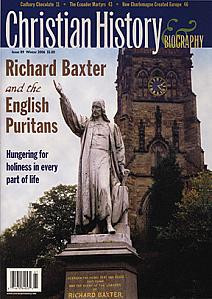English Congregationalists Adopted a Confession of Faith
CONGREGATIONALISTS in England fared poorly under Elizabeth I and the Stuart dynasty which followed her. Many were imprisoned, exiled, or executed. A branch of the Puritans, the Congregationalists wanted to cleanse the church of practices they considered superstitious—taking their name from their belief that each congregation of believers should be able to govern itself without outside interference. Perhaps the earliest Congregationalists were to be found in a group seized at Plummer’s Hall in London in 1567. They had obtained a permit to conduct a wedding, but were discovered worshiping and many were imprisoned. In spite of the monarchy’s practice of martyring them, the numbers of Congregationalists grew.
Under Oliver Cromwell’s leadership, the Congregationalists were legitimized and several sat in the Westminster Assembly in the 1640’s. While in general agreement with the Westminster Confession, a few protested its Presbyterian form of church government. Congregationalists decided they needed a confession of their own.
In September 1658, two hundred representatives of a hundred independent churches gathered at the Savoy Palace in London. Their task was to adopt a confession of faith. Enemies had accused independents such as the Congregationalists of being “the sink of all heresies and schisms.” Therefore an important consideration for the committee was to show that independents were solidly committed to Reformation teachings and to provide a standard of doctrine by which local congregations could test their ministerial candidates.
On this day, 12 October 1658, the independents adopted their new confession. It was titled, A Declaration of the Faith and Order Owned and Practiced in the Congregational Churches in England. To show their doctrinal soundness, the authors closely followed the Westminster Confession. Their two principal changes were substituting the autonomy of local churches in place of a presbytery of elders, and increasing the emphasis on God’s sovereignty as opposed to human responsibility.
The Declaration never became popular or supplanted the Westminster Confession in Congregational churches but was an important milestone in declaring the principles of Congregationalism. It influenced New England Congregationalism, too, and, as Rev. Derek Swann, a British Congregationalist pastor and scholar, wrote in 1981, “It may be an old landmark, but it is a true and safe one.”
—Dan Graves
------------
For more about the Puritan movement that inspired the English Congregationalists, read Christian History #89, Richard Baxter & the English Puritans






